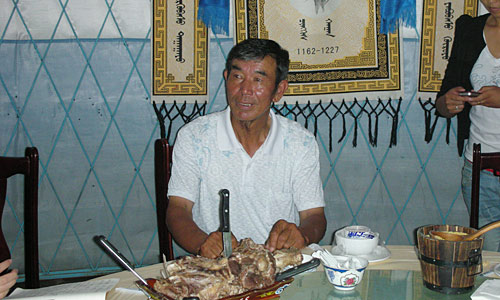|
 |
|
HAPPY BUSINESS: Aotegen Chagan, a 56-year-old herdsman of the Gandeer Grassland, introduces his yurt tourism business on July 14 (YIN PUMIN) |
He said that barn feeding allowed him to rear more sheep, because the supply of food could be guaranteed and there were fewer ewes that miscarried. He earned more than 400,000 yuan ($58,565) last year selling goats.
"I raised more than 600 goats and their birth rate is fairly high. A female goat can produce 2.5 lambs on average each year," Liu said. "The raising costs can be easily covered by selling cashmere so those lambs are profit."
Like other ecological migrants, Chaganhuhen also left her original home on the grasslands in an effort to find a new way of making a living in such a challenging environment.
"My family left our pasture three years ago," said the 41-year-old Mongolian woman, who now runs a grocery store in Bayinbaoli Town of Wulate Rear Banner in Bayan Nur City, where she sells dried meat and dairy products.
"When we lived in the pastures, it was impossible to save money. After a whole year of hard work, all our income from selling cashmere and lamb was used to pay off debt. But now the situation is different. When business is good, I can make a gross income of 5,000 yuan ($735) a day," she said.
But, ecological relocation is a painful, ongoing process, which requires time for the fragile ecosystem of the grasslands to recover, said Ah Long.
Many of those whose families lived on the grasslands for generations pine for their former way of life.
"Although the government distributed farming land to us and organized training to teach us how to farm, I still know little about planting. I often miss my old home and village," said Bagenna, a 51-year-old Mongolian man.
Bagenna lived in Qiandamen Gacha, or Village, behind the Erlang Mountain. In 2007, he moved out of his hometown and settled down in Bayintala Gacha, a new migration village in Wulate Rear Banner, where he was granted 1.67 hectares of farmland and began his farming life.
"I had about 200 sheep then, sometimes 300 if the rainfall was heavier. I had to buy some feed 160 km away in front of the mountain at a high cost, if the grass was scarce due to a lack of rain," he said.
After moving into Bayintala Gacha, he received farming training organized free of charge by his village and county, and he learned from scratch.
In addition, his wife also receives nearly 600 yuan ($87.85) per month as a pension, which all men over 60 and women over 50 of the banner, are entitled to. But Bagenna still keeps his hometown in mind. "I am willing to move back when the environment recovers in my hometown," he said.
Inner Mongolia Data
Area: 1.18 million sq km
Population: 24.14 million
GDP (2009): 97.26 billion yuan ($14.3 billion)
Per-capita GDP: 40,225 yuan ($5,888)
Climate: Temperate continental climate
(Source: Inner Mongolia Autonomous Region)
| 